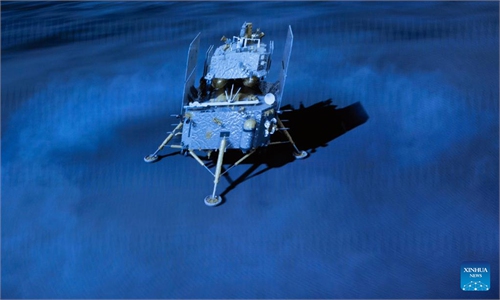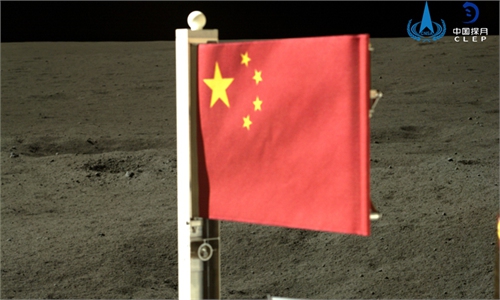
Illustration: Liu Rui/GT
China's Chang'e 6's recent landing on the dark side of the moon was a tremendous achievement for humanity and China. I say humanity, not only due to the international cooperation from partners like the French and European space agencies, as well as input from Italy and Pakistan, but because China is willing and keen to cooperate with all for the betterment of humanity.
Unfortunately, this attitude is not reflected by US elites who refuse to cooperate with China when it comes to space. For example, the US has banned China from the International Space Station (ISS). Despite this setback, China completed its own independent space station, named Tiangong ("Heavenly Palace"), in 2022.
China's space achievements prove that China, with its immense industrial and intellectual foundation, can make technological leaps without the US. On this alone, the US can't "win" a space race unless they reconfigure their attitude to incorporate win-win solutions through cooperation with China, which draws on China's growing abilities.
Currently, this seems unlikely with the US hyping up space as the new battleground to compete with China. In 2019, then-US president Donald Trump announced the Space Force, along with a $738 billion defense spending bill, saying "space is the world's newest war-fighting domain." In 2023, a Pentagon report claims that China has developed weapons, such as hypersonic missiles, capable of destroying satellites.
Since China announced its Aerospace Force in April, the US has been in a stir with US Space Force commander General Stephen Whiting warning of China's "breathtaking speed in space" threatening US space supremacy.
Considering China has a no-first-strike nuclear policy and its military force takes a defensive posture, what threat does China pose to the US? The threat is China's peaceful rise, which threatens US elites who, by attempting to maintain their hegemony, would "rather reign in hell than be angels in heaven." That is to say, US elites would rather maintain their dominance even if it has a negative impact on humanity.
China's advances in space reflect China's comprehensive development. All technology can have positive and negative effects. A microchip can power a smartphone or a surface-to-air-missile. For the US, even China's testing of the equivalent of a refueling tanker for satellites is considered a threat. From this perspective, the attempts to "win" in space reflect the broader trend to maintain hegemony across all fields, both technologically and economically. Unquestionably, this is immoral. The US with less than five percent of the global population should not contain the Global South. The region, including China, is set to rise and also take their rightful place in space development as they develop their technological capacities.
Clearly, any "win" for US elites is a loss for humanity, including US citizens who would benefit immensely from joint space cooperation with China and other future space powers. At worst, a "win" for the US, considering its history of destroying those who resist its hegemony, could lead to the destruction of humanity as any conflict in space could quickly escalate to nuclear war, the end of humanity and planetary destruction.
China's growing capacity in space isn't just a reflection of its wider economic and technological development; it's also a threat to the US' ability to attack others far beyond its shores. The US maintains its hegemony through its worldwide military presence, which depends on satellite communication. Thus, any ability China has to bring down or block US satellites is alarming for those who support the ability of one power to dominate and attack the rest of the Earth.
The dangers involved in a space race at best keep the world in a state of relative poverty and at worst could lead to an end of life. Considering this, it is sheer lunacy that Frank Kendall, Secretary of the US Air Force, and others talk about "long-term strategic competition" with China, in space, when China desires long-term strategic cooperation that benefits all of humanity.
What is the answer to our shared aforementioned dilemma? Outdated ideologies of civilizational competition must be dropped. They, along with technological advancements, brought the world together, creating a global consciousness under Western hegemony. However, the advances of planetary destructive technologies now mean our future is in need of multipolarity, technological cooperation and ideologies that support this end. We must allow the entirety of humanity to develop economically and technologically - there is no room for Earth against the Earth. The only way the US can "win" in space is by cooperating with China.
The author is an independent international relations analyst who focuses on China's socialist development and global inequality. opinion@globaltimes.com.cn



